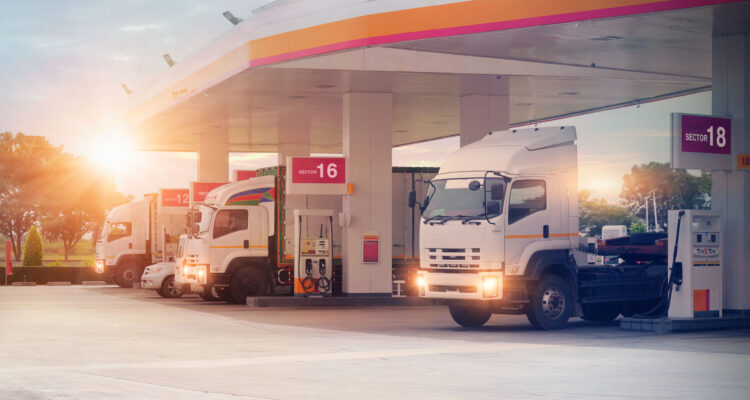Over the past few years, the global supply chain has been under increasing pressure from a never-ending series of uncontrollable macroeconomic factors. This has a knock-on effect on fleet managers, who have to alter their tactics to ensure that their business operations don’t stop dead in their tracks.
Adding to this and the record-high prices of fuel and inflation worldwide, we now have a transport and logistics sector extremely aware of the need to remain competitive and optimise all operating costs.
It’s not surprising then, that fleet managers are acutely focused on controlling their fuel costs – and implementing effective fuel tracking systems has topped the priority lists, and will continue to do so for the foreseeable future. We have seen ever-increasing engagement from fleet service partners and fleet specialists who use our fleet management platform, Wialon, in 150 countries to track and manage over 3.6 million vehicles and assets. As Wialon is the largest fleet management platform worldwide, in terms of the number of connected vehicles and assets, we believe that these trends are relevant for the overall sector.
So with this in mind, how do we go about lowering fuel costs? There are many different metrics that should be monitored, and each provides fleet managers with a deeper understanding and a clearer view of the overall efficiency of their fleets. Some of these metrics include driver behaviour, routes, delays in vehicle maintenance, and engine idling – all of which play a significant role in overall fuel costs.

Image source: Babel PR
Tracking software is all-important to optimise fleet maintenance
Any business operating a fleet can – and should – implement fleet management solutions to reduce vehicle downtime and unlock a more strategic approach to vehicle maintenance. It’s essential to take well-planned steps to reduce breakdowns, operational costs and also time spent at service stations. Fleet management and tracking solutions provide fleet managers with real-time updates about upcoming maintenance periods, in turn enabling proactive and predictive maintenance.
The biggest culprit for fuel waste
The most common offender of fuel waste is tyre quality. It can make a hugely significant difference to the total mileage a vehicle can get out of a full tank of gas. The US Government of Energy reported that 20% – 30% of a vehicle’s fuel consumption is directly tyre-related, mainly due to rolling resistance, which is how a tyre overcomes inertia. Fleet management solutions track metrics like tyre pressure, helping fleet managers to detect whether vehicles’ tyres are at optimal pressure or not in real-time so that they can take quick remedial action.
Utilising the power of telematics to prevent fuel thefts
The increase in fuel prices has also led to an increase in the number of cases of fuel theft. This is one of the biggest issues faced by heavy commercial vehicle (HCV) and heavy goods vehicle (HGV) fleets. In Europe alone, there were 2,300 cases of cargo and fuel theft incidents in 2022, with 944 thefts directly from vehicles, and a further 785 thefts targeting fuel specifically.
By utilising fuel tracking systems, fleet managers can pinpoint whether or not fuel has been stolen, which can help them to mitigate the issue and further drive down excess costs. Fleet tracking and management solutions also have additional features which can help to identify which drivers have syphoned fuel for personal use and detect drivers who regularly overestimate how much fuel they need. This in turn makes drivers more aware of these potential blindspots and will help to keep costs down even further.
How telematics solutions empower fleet managers to reduce fuel costs
By utilising telematics-based solutions, fleet managers can gain more visibility and insight into all aspects of their fleet operations. This is critical when monitoring costs.
GPS tracking technology and telematics solutions can be used to optimise vehicle routes, ensuring they are effective in terms of fuel consumption. Route planning can help to reduce the overall distance travelled and to avoid poor-quality roads, two key steps in reducing fuel consumption. Uneven road surfaces can wear down a vehicle’s critical components, including tyres and suspension. If left untreated, these parts will increase overall fuel consumption over time.
Additionally (and importantly!), telematics-based solutions can also monitor driver behaviour such as speeding, aggressive acceleration and harsh braking or cornering can increase fuel consumption significantly.
Another key piece of the cost management puzzle is engine idling, well-known for its wasteful impact. The Department of Energy reports that heavy-duty trucks consume about 0.8 gallons of fuel per hour while idling. Fleet managers can use telematics-based solutions to plan routes that avoid areas with high traffic to minimise engine idling and drive down the total cost of ownership. Additionally, fleet management software unlocks driver monitoring capabilities, which can also be used to decrease engine idling time.
Fleet vehicles are the driving force behind business and public mobility, and telematics and fleet management solutions are an important way to keep businesses moving more efficiently. With oil prices predicted to rise to over $110 per barrel in 2023, it is even more important for fleet managers to get a firm grasp on fuel costs. Fleet management technology provides the tools to achieve this and is leading the way when it comes to using data to bring order to an often chaotic area of business, by providing actionable insights for fleet managers.
One recommendation for fleet management providers to help fleet managers optimise fuel costs in the current climate is to work with small-to-medium-sized companies and ensure that they have the same visibility, quality of data and quality of software as a large fleet would have. This access to data will allow them to have the insights that they need to make informed decisions about their current fuel usage and make changes where necessary. According to the Federal Motor Carrier Safety Administration (FMCSA), around 97% of fleets have fewer than 20 trucks and 92% have fewer than six trucks in their fleet. With this in mind, it is more important than ever before to make sure that smaller-sized fleets are being provided with as much visibility and insight into their fuel usage as large fleets. With a ‘big fleet’ mindset, these companies will be able to drive a big change throughout the industry.
Author: Aliaksandr Kuushynau, Head of Wialon, an ultimate software platform for fleet managers






